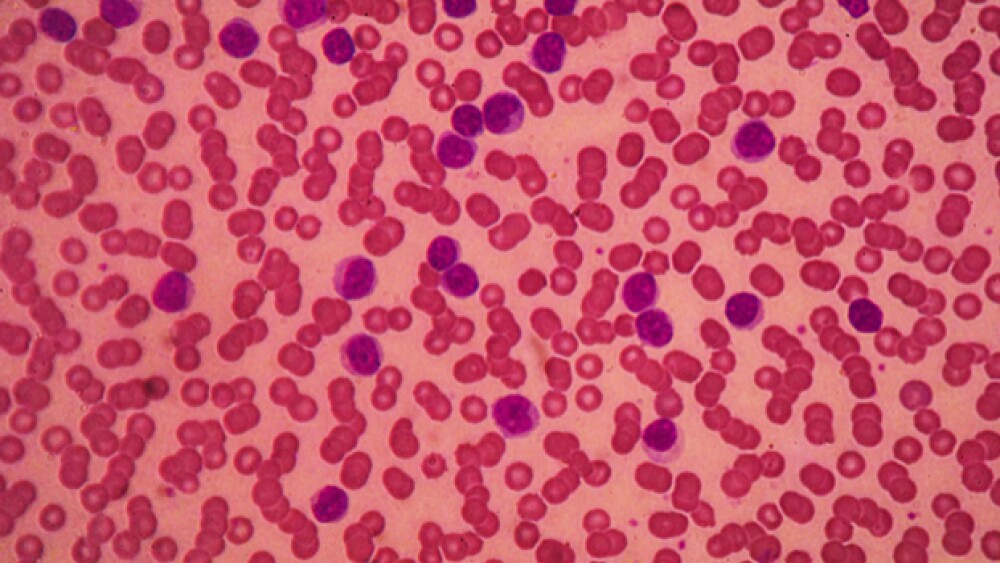Shares of Verastem closed out Monday trading on a positive note and continues to climb in the premarket following the greenlight for leukemia drug Copiktra, an inhibitor of phosphoinositide 3-kinase (PI3K)-delta and PI3K-gamma.
Blood smear showing the presence of chronic lymphocytic leukemia (CLL).
Shares of Verastem closed out Monday trading on a positive note and continues to climb in the premarket following the greenlight for leukemia drug Copiktra, an inhibitor of phosphoinositide 3-kinase (PI3K)-delta and PI3K-gamma.
The U.S. Food and Drug Administration (FDA) approved Copiktra (duvelisib) as a third-line treatment for adult patients with relapsed or refractory chronic lymphocytic leukemia/small lymphocytic lymphoma (CLL/SLL). Verastem said that Copiktra also received accelerated approval as a second-line treatment for adult patients with relapsed or refractory follicular lymphoma (FL). The indication in FL is approved under accelerated approval based on overall response rate, the company said. Verastem said continued approval “may be contingent upon verification and description of clinical benefit in confirmatory trials.”
Robert Forrester, president and chief executive officer of Verastem Oncology, said the approval of Copiktra demonstrates that the company is delivering on its commitment to cancer patients by bringing a new oral treatment to market. Forrester added that the company is pleased to be able to introduce the newly approved drug at the end of National Blood Cancer Awareness Month. Verastem said that Copiktra will immediately be available for patients in the United States. Joseph Lobacki, Verastem’s chief commercial officer said that in preparation for the launch of Copiktra, Verastem has assembled an experienced commercial team and established a distribution network.
Lymphoma is the most common blood cancer, and CLL/SLL and FL are common types of indolent non-Hodgkin’s lymphomas. There are an estimated 681,000 people living with non-Hodgkin’s lymphoma in the US alone, including nearly 350,000 cases of CLL/SLL or FL, Verastem said. Many of these patients will eventually relapse or develop refractory diseases.
“At Verastem Oncology, we are driven by the strength and courage of those battling cancer, and we are committed to advancing therapies such as Copiktra with the potential to make a significant impact for patients, their caregivers and physicians. We are immensely grateful to the many patients who participated in the duvelisib clinical trial program over the years leading to this pivotal moment,” Forrester said in a statement.
Approval for Clopiktra was based on positive Phase III trial results that showed the medication demonstrated a superiorprogression-freee survival over ofatumumab (Novartis’ Arzerra), a standard of care treatment for CLL. Trial data showed that patients taking Copiktra achieved a statistically significant improvement in median progression free survival of 13.3 months. That was compared to 9.9 months for patients taking ofatumumab. At the time, the company said those numbers represent a 48 percent reduction in the risk of progression or death.
Verastem acquired Copiktra in 2016 from Infinity Pharmaceuticals, who gained it from AbbVie.
“We are excited to offer a new treatment that can allow patients to manage their disease with an oral monotherapy,” CCO Lobacki said in a statement.
While Copiktra will be available immediately, the drug does come with a Boxed Warning regarding four fatal and/ or serious toxicities: infections, diarrhea or colitis, cutaneous reactions, and pneumonitis. The company said it is implementing an informational risk evaluation and mitigation strategy to provide appropriate dosing and safety information to support management of the medication. The medication also associated with adverse reactions that could require dose reduction, treatment delay or discontinuation of the medication, Verastem added. The most common adverse reactions during clinical trials were diarrhea or colitis, neutropenia, rash, fatigue, pyrexia, cough, nausea, upper respiratory infection, pneumonia, musculoskeletal pain, and anemia. The company also noted that it will provide an assistance program to help patients have access to the medication.





